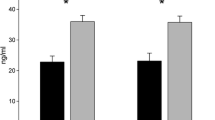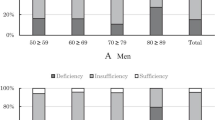Abstract
There is currently insufficient information on serum 25-hydroxyvitamin D (25OHD) and parathyroid hormone (PTH) concentrations, and bone mineral status in healthy adolescents to allow reference values to be set. This study aimed to provide comparable data on vitamin D status in Japanese adolescents and to assess sex differences in susceptibility to vitamin D insufficiency. Serum 25OHD and PTH concentrations were measured in 1,380 healthy adolescents (aged 12–18 years). Subjects completed a questionnaire on exercise history, diet, and lifestyle factors. Calcaneal stiffness was evaluated by quantitative ultrasound. Serum 25OHD concentrations in boys and girls were 60.8 ± 18.3 and 52.8 ± 17.0 nmol/L, respectively. Approximately 30 % of boys and 47 % of girls had suboptimal 25OHD concentrations (<50 nmol/L). Serum PTH concentration was negatively correlated with serum 25OHD concentration in boys, but negatively correlated with calcium intake rather than serum 25OHD in girls. In contrast, the increment in calcaneal stiffness as a result of elevation of serum 25OHD was higher in girls than in boys. As vitamin D deficiency is common in Japanese adolescents, it was estimated that intakes of ≥12 and ≥14 μg/day vitamin D would be required to reach 25OHD concentrations of 50 nmol/L in boys and girls, respectively. Moreover, the results of the present study indicate that vitamin D deficiency has a greater association with calcaneal stiffness in girls than in boys.






Similar content being viewed by others
References
Dawson-Hughes B, Dallal GE, Krall EA, Harris S, Sokoll LJ, Falconer G (1991) Effect of vitamin D supplementation on wintertime and overall bone loss in healthy postmenopausal women. Ann Intern Med 115:505–512
Oliveri MB, Ladizesky M, Mautalen CA, Alonso A, Martinez L (1993) Seasonal variations of 25 hydroxyvitamin D and parathyroid hormone in Ushuaia (Argentina), the southernmost city of the world. Bone Miner 20:99–108
Guillemant J, Taupin P, Le HT, Taright N, Allemandou A, Pérès G, Guillemant S (1999) Vitamin D status during puberty in French healthy male adolescents. Osteoporos Int 10:222–225
Outila TA, Kärkkäinen MU, Lamberg-Allardt CJ (2001) Vitamin D status affects serum parathyroid hormone concentrations during winter in female adolescents: associations with forearm bone mineral density. Am J Clin Nutr 74:206–210
Harkness L, Cromer B (2005) Low levels of 25-hydroxy vitamin D are associated with elevated parathyroid hormone in healthy adolescent females. Osteoporos Int 16:109–113
Harinarayan CV, Ramalakshmi T, Prasad UV, Sudhakar D, Srinivasarao PV, Sarma KV, Kumar EG (2007) High prevalence of low dietary calcium, high phytate consumption, and vitamin D deficiency in healthy south Indians. Am J Clin Nutr 85:1062–1067
Hill TR, Cotter AA, Mitchell S, Boreham CA, Dubitzky W, Murray L, Strain JJ, Flynn A, Robson PJ, Wallace JM, Kiely M, Cashman KD (2009) Vitamin D status and parathyroid hormone relationship in adolescents and its association with bone health parameters: analysis of the Northern Ireland Young Heart’s Project. Osteoporos Int 21:695–700
Lehtonen-Veromaa MK, Möttönen TT, Nuotio IO, Irjala KM, Leino AE, Viikari JS (2002) Vitamin D and attainment of peak bone mass among peripubertal Finnish girls: a 3-y prospective study. Am J Clin Nutr 76:1446–1453
Kärkkäinen MU, Wiersma JW, Lamberg-Allardt CJ (1997) Postprandial parathyroid hormone response to four calcium-rich foodstuffs. Am J Clin Nutr 65:1726–1730
Hirota T, Kusu T, Hirota K (2005) Improvement of nutrition stimulates bone mineral gain in Japanese school children and adolescents. Osteoporos Int 16:1057–1064
The National Health and Nutrition Survey Japan (2007) http://www.mhlw.go.jp/bunya/kenkou/eiyou09/01.html. Accessed 15 Apr 2015
The National Health and Nutrition Survey in Japan (2009) Ministry of Health, Labour and Welfare, Japan. Daiichishuppan, Japan
Ersfeld DL, Rao DS, Body JJ, Sackrison JL Jr, Miller AB, Parikh N, Eskridge TL, Polinske A, Olson GT, MacFarlane GD (2004) Analytical and clinical validation of the 25 OH vitamin D assay for the LIAISON automated analyzer. Clin Biochem 37:867–874
Uenishi K, Ishida H, Nakamura K (2008) Development of a simple food frequency questionnaire to estimate intakes of calcium and other nutrients for the prevention and management of osteoporosis. J Nutr Sci Vitaminol 54:25–29
Holick MF, Binkley NC, Bischoff-Ferrari HA, Gordon CM, Hanley DA, Heaney RP, Murad MH, Weaver CM (2011) Evaluation, treatment, and prevention of vitamin D deficiency: an Endocrine Society clinical practice guideline. J Clin Endocrinol Metab 96:1911–1930
Rosen CJ (2011) Vitamin D insufficiency. N Engl J Med 364:248–254
Absoud M, Cummins C, Lim MJ, Wassmer E, Shaw N (2011) Prevalence and predictors of vitamin D insufficiency in children: a Great Britain population based study. PLoS One 6:e22179
Ross AC, Manson JE, Abrams SA, Aloia JF, Brannon PM, Clinton SK, Durazo-Arvizu RA, Gallagher JC, Gallo RL, Jones G, Kovacs CS, Mayne ST, Rosen CJ, Shapses SA (2011) The 2011 report on dietary reference intakes for calcium and vitamin D from the Institute of Medicine: what clinicians need to know. J Clin Endocrinol Metab 96:53–58
Uenishi K, Ishimi Y, Nakamura K, Kodama H, Esashi T (2013) Dietary reference intakes for Japanese 2010: macrominerals. J Nutr Sci Vitaminol 59:S83–S90
Harkness LS, Cromer BA (2005) Vitamin D deficiency in adolescent females. J Adolesc Health 37:75
Lehtonen-Veromaa M, Möttönen T, Nuotio I, Irjala K, Viikari J (2002) The effect of conventional vitamin D2 supplementation on serum 25(OH)D concentration is weak among peripubertal Finnish girls: a 3-y prospective study. Eur J Clin Nutr 56:431–437
Weng FL, Shults J, Leonard MB, Stallings VA, Zemel BS (2007) Risk factors for low serum 25-hydroxyvitamin D concentrations in otherwise healthy children and adolescents. Am J Clin Nutr 86:150–158
Ginty F, Cavadini C, Michaud PA, Burckhardt P, Baumgartner M, Mishra GD, Barclay DV (2004) Effects of usual nutrient intake and vitamin D status on markers of bone turnover in Swiss adolescents. Eur J Clin Nutr 58:1257–1265
Das G, Crocombe S, McGrath M, Berry JL, Mughal MZ (2006) Hypovitaminosis D among healthy adolescent girls attending an inner city school. Arch Dis Child 91:569–572
Gordon CM, DePeter KC, Feldman HA, Grace E, Emans SJ (2004) Prevalence of vitamin D deficiency among healthy adolescents. Arch Pediatr Adolesc Med 158:531–537
Looker AC, Dawson-Hughes B, Calvo MS, Gunter EW, Sahyoun NR (2002) Serum 25-hydroxyvitamin D status of adolescents and adults in two seasonal subpopulations from NHANES III. Bone 30:771–777
González-Gross M, Valtueña J, Breidenassel C, Moreno LA, Ferrari M, Kersting M, De Henauw S, Gottrand F, Azzini E, Widhalm K, Kafatos A, Manios Y, Stehle P (2012) Vitamin D status among adolescents in Europe: the Healthy Lifestyle in Europe by Nutrition in Adolescence study. Br J Nutr 107:755–764
Looker AC, Pfeiffer CM, Lacher DA, Schleicher RL, Picciano MF, Yetley EA (2008) Serum 25-hydroxyvitamin D status of the US population: 1988–1994 compared with 2000–2004. Am J Clin Nutr 88:1519–1527
Dong Y, Pollock N, Stallmann-Jorgensen IS, Gutin B, Lan L, Chen TC, Keeton D, Petty K, Holick MF, Zhu H (2010) Low 25-hydroxyvitamin D levels in adolescents: race, season, adiposity, physical activity, and fitness. Pediatrics 125:1104–1111
Rovner AJ, O’Brien KO (2008) Hypovitaminosis D among healthy children in the United States: a review of the current evidence. Arch Pediatr Adolesc Med 162:513–519
Zhu K, Zhang Q, Foo LH, Trube A, Ma G, Hu X, Du X, Cowell CT, Fraser DR, Greenfield H (2006) Growth, bone mass, and vitamin D status of Chinese adolescent girls 3 y after withdrawal of milk supplementation. Am J Clin Nutr 83:714–721
Du X, Greenfield H, Fraser DR, Ge K, Trube A, Wang Y (2001) Vitamin D deficiency and associated factors in adolescent girls in Beijing. Am J Clin Nutr 74:494–500
Marwaha RK, Tandon N, Reddy DR, Aggarwal R, Singh R, Sawhney RC, Saluja B, Ganie MA, Singh S (2005) Vitamin D and bone mineral density status of healthy schoolchildren in northern India. Am J Clin Nutr 82:477–482
Tanaka K, Terao J, Shidoji Y, Tamai H, Imai E, Okano T (2013) Dietary reference intakes for Japanese 2010: fat-soluble vitamins. J Nutr Sci Vitaminol 59:S57–S66
Institue of medicin of the National Academies (2011) Dietary reference intakes: calcium, vitamin D. The National Academies Press, pp 370–384. http://www.iom.edu/reports/2010/dietary-reference-intakes-for-calcium-and-vitamin-d.aspx
Chapuy MC, Preziosi P, Maamer M, Arnaud S, Galan P, Hercberg S, Meunier PJ (1997) Prevalence of vitamin D insufficiency in an adult normal population. Osteoporos Int 7:439–443
Okazaki R, Sugimoto T, Kaji H, Fujii Y, Shiraki M, Inoue D, Endo I, Okano T, Hirota T, Kurahashi I, Matsumoto T (2011) Vitamin D insufficiency defined by serum 25-hydroxyvitamin D and parathyroid hormone before and after oral vitamin D load in Japanese subjects. J Bone Miner Metab 29:103–110
Krabbe S, Christiansen C, Rødbro P, Transbøl I (1979) Effect of puberty on rates of bone growth and mineralization: with observations in male delayed puberty. Arch Dis Child 54:950–953
Neer RM, Arnaud CD, Zanchetta JR, Prince R, Gaich GA, Reginster JY, Hodsman AB, Eriksen EF, Ish-Shalom S, Genant HK, Wang O, Mitlak BH (2001) Effect of parathyroid hormone (1–34) on fractures and bone mineral density in postmenopausal women with osteoporosis. N Engl J Med 344:1434–1441
Krabbe S, Transbøl I, Christiansen C (1982) Bone mineral homeostasis, bone growth, and mineralisation during years of pubertal growth: a unifying concept. Arch Dis Child 57:359–363
Cadogan J, Blumsohn A, Barker ME, Eastell R (1998) A longitudinal study of bone gain in pubertal girls: anthropometric and biochemical correlates. J Bone Miner Res 13:1602–1612
Bauer DC, Glüer CC, Cauley JA, Vogt TM, Ensrud KE, Genant HK, Black DM (1997) Broadband ultrasound attenuation predicts fractures strongly and independently of densitometry in older women. A prospective study. Study of Osteoporotic Fractures Research Group. Arch Intern Med 157:629–634
Schott AM, Hans D, Duboeuf F, Dargent-Molina P, Hajri T, Bréart G, Meunier PJ (2005) Quantitative ultrasound parameters as well as bone mineral density are better predictors of trochanteric than cervical hip fractures in elderly women. Results from the EPIDOS study. Bone 37:858–863
Yamamoto K, Nakatsuji T, Yaoi Y, Yamato Y, Yanagitani T, Matsukawa M, Yamazaki K, Matsuyama Y (2012) Relationships between the anisotropy of longitudinal wave velocity and hydroxyapatite crystallite orientation in bovine cortical bone. Ultrasonics 52:377–386
Frost ML, Blake GM, Fogelman I (2001) Quantitative ultrasound and bone mineral density are equally strongly associated with risk factors for osteoporosis. J Bone Miner Res 16:406–416
Nicholson PH, Müller R, Cheng XG, Rüegsegger P, Van Der Perre G, Dequeker J, Boonen S (2001) Quantitative ultrasound and trabecular architecture in the human calcaneus. J Bone Miner Res 16:1886–1892
Acknowledgments
This work was partly supported by a Grant-in-Aid from the Japan Osteoporosis Foundation, a Grant-in-Aid (#20590078) from the Ministry of Education, Culture, Science, Sports and Technology of Japan, a Grant-in-Aid for Comprehensive Research on Cardiovascular Diseases and Research on Dietary Reference Intakes in the Japanese from the Ministry of Health Labor, and Welfare of Japan. We would like to thank Kyowa Medex Co., Ltd for the measurement of serum 25OHD concentrations.
Conflict of interest
Although Naoko Tsugawa and Toshio Okano were funded by Kyowa Medex Co., Ltd, it played no part in the design of the study, collection and analysis of data and decision to publish. The other authors declare no conflict of interest.
Author information
Authors and Affiliations
Corresponding author
About this article
Cite this article
Tsugawa, N., Uenishi, K., Ishida, H. et al. Association between vitamin D status and serum parathyroid hormone concentration and calcaneal stiffness in Japanese adolescents: sex differences in susceptibility to vitamin D deficiency . J Bone Miner Metab 34, 464–474 (2016). https://doi.org/10.1007/s00774-015-0694-y
Received:
Accepted:
Published:
Issue Date:
DOI: https://doi.org/10.1007/s00774-015-0694-y




